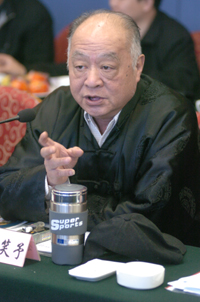
The rising of other cultural forms such as musicals, dramas and popular songs is affecting local operas across China. This is the case with local operas in Hubei Province. In an exclusive interview with china.org.cn, Yu Xiaoyu, an opera writer and director, gave his thoughts on the subject.
Both the Han and Chu operas are facing difficult times, according to Yu. As young people show no enthusiasm about them, they are short of performers as well as audience.
In an effort to win back audiences, the traditional entertainment takes in fashionable elements, such as dazzling lights, luxury scenery and elaborate costumes.
But Yu pointed out that the top-notch artistic work is not about lights, stage sets and costumes. The soul of an opera is the story, the music, the voices and the abilities of the performers. He was not saying the new approach is wrong. It could perhaps make a good opera a little better but couldn’t improve a bad one, Yu said.
He said rejuvenation of local operas must be focused on small communities. Villagers were the most faithful audiences of local operas. And at the same time it was important to nurture the interests of people with works which touched them.
Almost all the Hubei opera troupes had heavy financial burdens. Few of them had their own theaters and some were so short of funds they were unable to rent a theater for rehearsals.
Opera troupes were regarded as public institutions in the planed economy era. They enjoyed the financial support of government and their funding allocation was tied to the number of people they employed. So every troupe had their own make-up artists, dress designers, lighting engineers and even complete stage designers.
But now as the troupes face stiff market competition, they find themselves under heavy financial burdens as they have to support a large number of retirees. To solve the problem, Yu said, troupes have to cut themselves free of that particular burden by buying their staff social insurance.
Shen Haining, vice director of the provincial culture department, said that the government would give some financial supports to those troupes trying to stage top works and create new productions. But the main policy is to let troupes survive in market competition.
In Hubei there are over 20 local companies including Han, Jingzhou flower-drum, Chu, Huangmei, Tea-picking and Nan operas. The Han and Chu operas are popular across the whole province.
Known as one of the sources of Beijing Opera, the 300-year-old Han Opera has an especially rich flavor of regional culture. It has a complete troupe of performers and their work is regarded as being very expressive. Chu Opera is characterized by plain language with a heavy rural touch. Originated at the turn of the Ming (1368-1644) and Qing (1644-1911) dynasties, Huangmei Opera is regarded as being extremely influential with its wide variety of arias.
(China.org.cn by Staff reporter Chen Lin, May 8, 2006)
|

